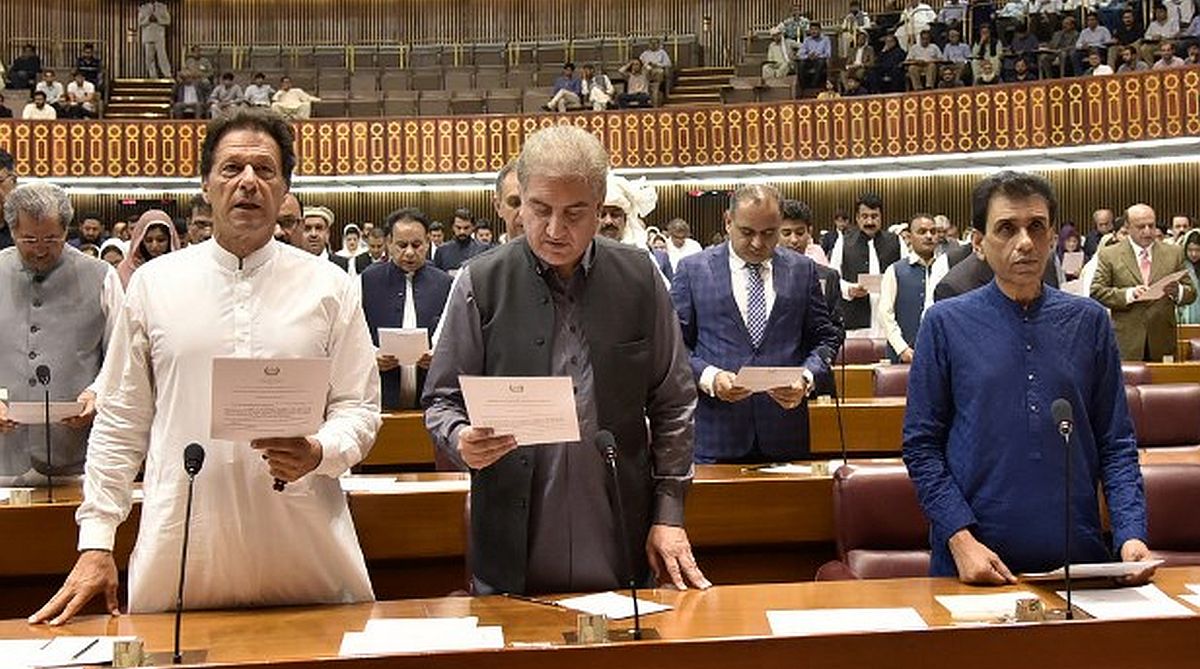Pak rakes up Indian missile firing with UN chief
Pakistan continued to act with restraint and responsibility, the Foreign Minister said.
Qureshi happened to be in India when Pakistan-based terrorists carried out audacious terror attacks in Mumbai and he was asked to leave the country

Pakistan's PM Imran Khan, with his foreing minister Shah Mahmood Qureshi (centre). (Photo: AFP)
New Delhi needs to be wary of new Foreign Minister of Pakistan Shah Mahmood Qureshi, given his past when he was considered a hawk on relations with India as a minister with the same portfolio in the Pakistan Peoples Party (PPP) government from 2008 to 2011.
In fact, he was dropped from the foreign affairs portfolio in February 2011 shortly before India and Pakistan were scheduled to resume their stalled dialogue.
Advertisement
In Indian circles, Qureshi, Vice-President of Imran Khan’s Pakistan Tehreek-e-Insaf (PTI), is identified with at least two major episodes that changed the dynamics of India-Pakistan relations.
Advertisement
One was the 26/11 Mumbai terror attack and the other was the failure of the much-anticipated foreign ministers’ meeting between the two countries in Islamabad in July 2010.
Qureshi happened to be in India when Pakistan-based terrorists carried out audacious terror attacks at different places in India’s commercial capital. He was in the midst of a press conference when the then External Affairs Pranab Mukherjee contacted him through a journalist on phone and asked him to leave India immediately.
Mukherjee, the former President, has written this in the third volume of his autobiography, The Coalition Years 1996-2012. When Qureshi came on line, Mukherjee read out a note prepared by the foreign secretary.
“Mr Minister, no purpose will be served by your continuing to stay in India in these circumstances. I advise you to leave immediately. My official aircraft is available to take you back home. But it would be desirable if a decision is taken as quickly as possible,” Mukherjee told the visiting minister.
Relations between the two countries remained frozen for more than one and a half years after the Mumbai incidents. Then a meeting was scheduled between the foreign ministers of the two countries to draw up a road-map for restarting the stalled dialogue process.
SM Krishna, who had by then taken over as the External Affairs Minister, travelled to Islamabad for talks with Qureshi. But marathon talks between them ended in a disaster, giving a huge setback to the normalisation process.
During a joint press conference at the Pakistan foreign office with Krishna, Qureshi attacked India for what he called ‘human rights violations’ in Jammu and Kashmir and demanded a definite time-frame for resolving the issue even as the Indian minister asked Pakistan to show sincerity in conducting a speedy trial of the seven LeT operatives arrested on the Pakistani side for their involvement in the Mumbai mayhem.
It is widely believed that Qureshi acted as per the dictates of the then Pakistan Army chief, Gen Ashfaq Pervez Kayani, who obviously did not want the talks to succeed.
Qureshi was again in news in recently when he inadvertently stepped into Indian territory while visiting the Wagah Border to express sympathy with Pakistani Rangers in the wake of a major suicide attack. While visiting the ‘Zero Line’, he went ahead to shake hands with Indian officials and in the process stepped into the Indian side of the border. He was immediately pulled back by the Pakistani security personnel.
Advertisement